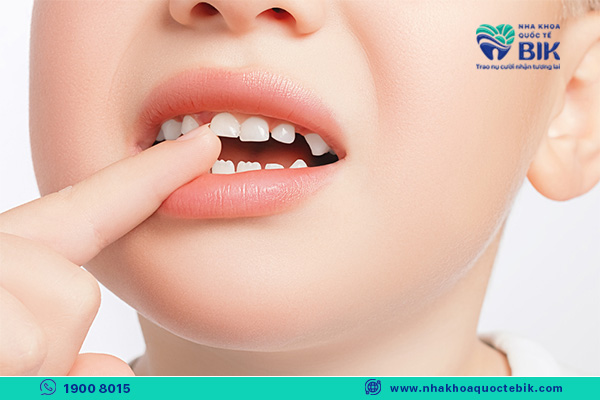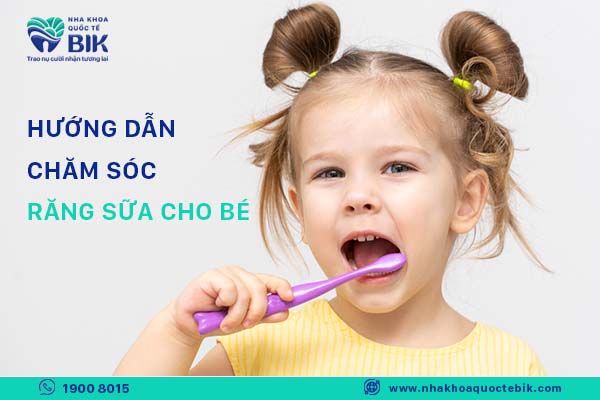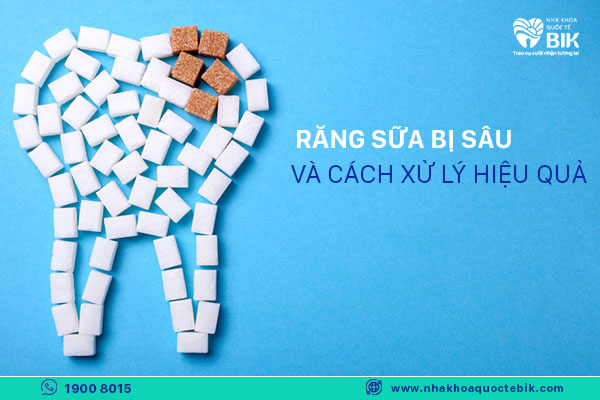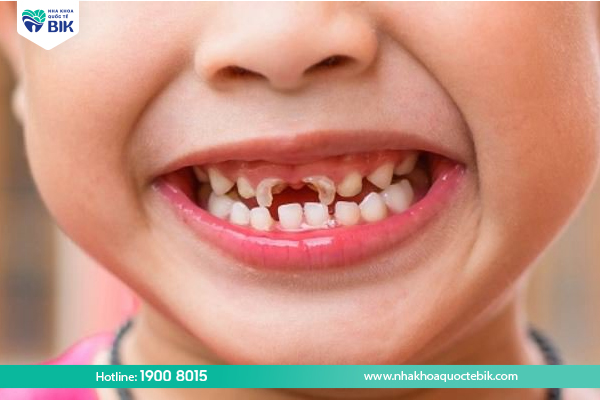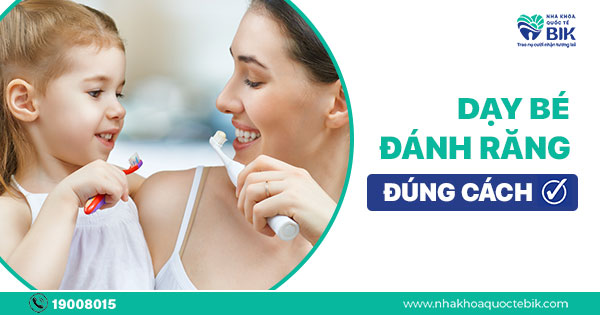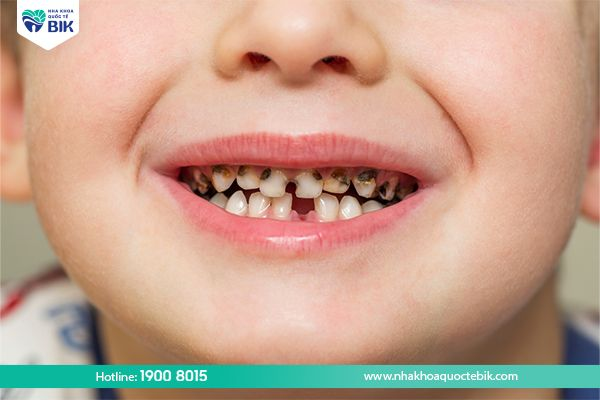Tooth decay is a common condition in young children due to the habit of eating a lot of sweets, which makes it easy for bacteria to grow in the oral cavity and attack the tooth enamel. When it has progressed to a certain stage, tooth decay will cause children to feel pain and persistent discomfort, which will affect their daily activities. So let’s find out with BIK International Dentistry what to do when children have tooth decay in the article below!
1. How does tooth decay affect children?
Tooth decay can have specific effects on the health of young children:
1.1. Toothache
In the early stages of tooth decay, children may not feel pain or tooth sensitivity, but when the cavities become larger and larger, even reaching the pulp, children will have to face severe and extremely uncomfortable pain.
This affects children’s daily activities as well as their spirit. From then on, children become irritable, difficult and lazy to communicate with people when the decayed tooth still brings pain every day.
1.2. Feeling uncomfortable
Bacteria will attack, causing a concave hole on the tooth surface, which makes food debris easily stuck, causing children to feel uncomfortable. At this time, children tend to use their hands to remove food debris, which can accidentally damage the gums and gums. In addition, food that remains for a long time will gradually decompose and cause bad breath.
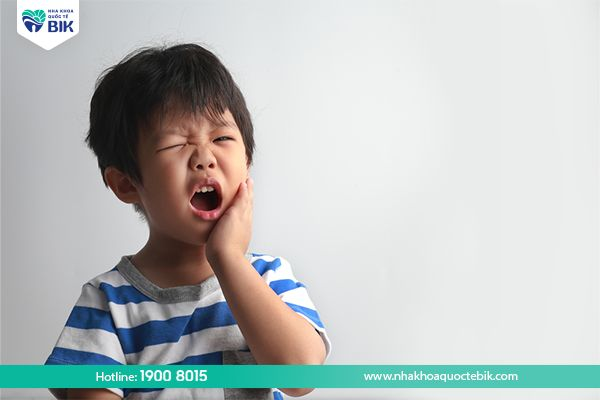
1.3. Damaged tooth pulp
If tooth decay is not detected and treated early, the decay can spread to the tooth pulp, causing pulpitis. In cases where pulpitis can be treated, the doctor will remove the pulp and fill the tooth. However, if the pulpitis is severe, the doctor may recommend tooth extraction to ensure that the adjacent teeth are not affected.
1.4. Affects digestion
Tooth decay creates a feeling of constant pain, making the chewing process difficult. Tooth decay will no longer be able to chew and crush food, causing the stomach to work too hard to digest food. This can affect the digestive system if it occurs for a long time, leading to diseases such as stomach pain, gastritis, etc.
2. What to do when your child has a toothache?
There are many ways to relieve toothache in children, parents can refer to the following methods:
2.1. Rinse your mouth with diluted salt water
Salt water not only helps clean the oral cavity, kill tooth decay bacteria but also effectively relieves toothache. Parents dilute a mixture of warm water and salt in a 5:1 ratio and let their child rinse their mouth with salt water every morning after brushing their teeth and at night before going to bed. In addition, children should also get into the habit of rinsing their mouth with salt water after every meal to completely clean their mouth.
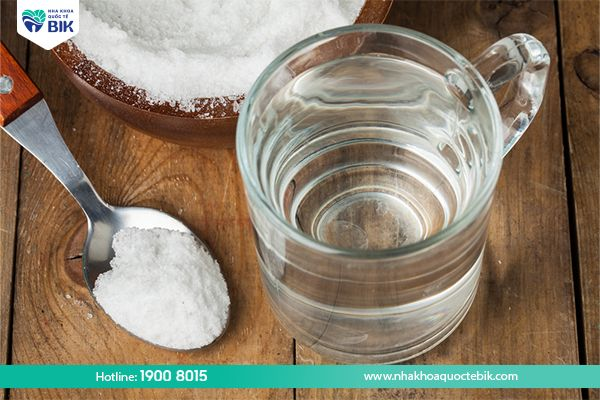
2.2. Cold compress for children
Applying ice is one of the simplest but most effective ways to relieve toothache. Ice will paralyze the sensory nerves, thereby quickly relieving toothache. However, note that you should not apply ice directly to the child’s toothache to avoid discomfort.
Parents should wrap ice in a soft towel and apply it to the cheek area where the child’s tooth is aching for about 7 minutes, then move to another area. This method will temporarily block the pain signal from reaching the brain due to the temperature from the ice.
2.3. Use clove essential oil
Clove essential oil has long been known as a medicinal herb with strong antibacterial, anti-inflammatory and antioxidant properties. Therefore, to relieve toothache pain in children, mothers just need to take a cotton ball, dip it in clove essential oil and place it on the cavity. Let the child hold it for a while, then spit it out and rinse the mouth with warm water.
Not only that, clove essential oil also helps eliminate bad breath and is very safe, if the child accidentally swallows it, there is no problem.
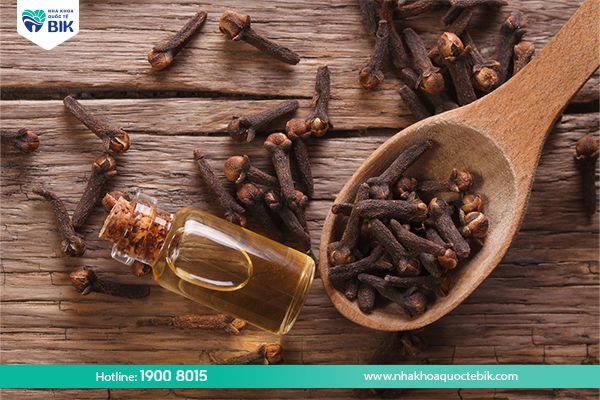
2.4. Using fresh lemon juice
Fresh lemon is known as an ingredient that has very good antibacterial and anti-inflammatory effects. This is also a simple ingredient and is chosen by many people to effectively treat tooth decay in children. Mothers just need to wash a lemon, squeeze the juice and apply it to the child’s decayed tooth.
Note that this method should only be applied about 3 times/week to avoid tooth enamel erosion.

2.5. Using ginger and garlic
Ginger and garlic are also folk ingredients used to effectively treat tooth decay in children. Garlic contains the active ingredient allicin, which has strong antibacterial properties, so mothers only need to crush garlic and ginger with a few grains of salt and then apply the mixture to the painful cavity area. Let the baby hold it for about 15 – 20 minutes, the pain will subside and no longer feel uncomfortable. However, mothers should dilute the garlic because it can irritate or burn the baby’s gums.
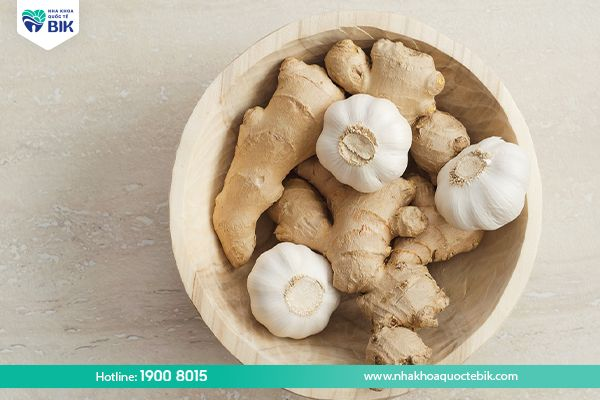
3. Completely treat tooth decay in children at the dentist
To completely treat tooth decay in children and completely stop the uncomfortable pain, parents need to take their children to the dentist for examination and advice on the most appropriate treatment methods based on each specific condition:
3.1. Mild tooth decay
Usually, in cases where the teeth only have tiny black spots, the doctor will perform enamel remineralization. The doctor will prescribe your child to use anti-cavity drugs such as phosphate, calcium, fluoride to fill the surface of the decayed tooth. This method is relatively gentle and simple, not causing pain to the child. At this time, the child’s teeth are still preserved to the maximum, not affecting the child’s oral health.
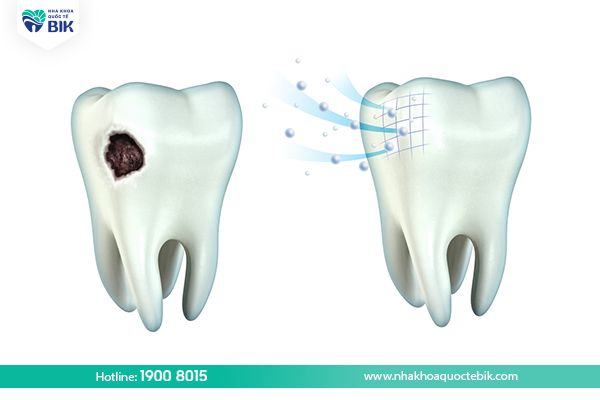
3.2. Severe tooth decay
When the cavity has spread and formed black holes that cause tooth chipping and the child often feels severe pain, the doctor must intervene with dental instruments to check if the tooth decay has spread to the pulp. If the pulp is infected, endodontic treatment is required before filling the tooth.
In some cases, tooth decay causes alveolar abscess, severe pulpitis without treatment, the doctor must extract the tooth to prevent the cavity from spreading, affecting the adjacent teeth and avoiding complications for permanent teeth that grow later.
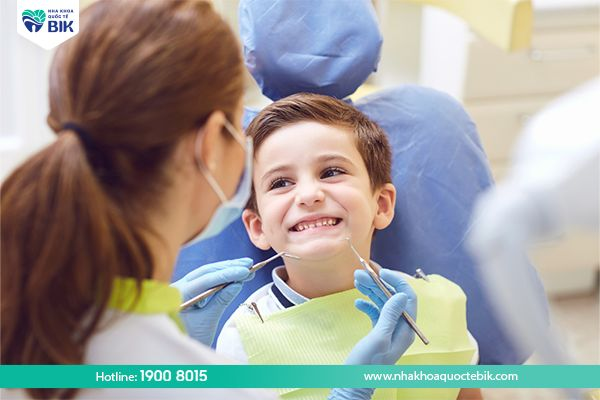
4. How to prevent tooth decay in children?
To prevent tooth decay in children from the early days, parents should note the following:
4.1. Proper oral hygiene
– Parents should start cleaning their children’s teeth as soon as their teeth start to grow so that they get used to having a clean mouth at all times.
– Get your child into the habit of brushing their teeth in the morning when they wake up and in the evening before going to bed. In addition, encourage your child to brush their teeth within 30 minutes after each meal.
– For children from 18 months to 6 years old, parents should give their child a small toothbrush that fits their mouth and can be a toothbrush with a shape that the child likes to encourage their child to clean their teeth.
– Replace the toothbrush every 3-4 months to ensure that bacteria do not accumulate and attack, causing tooth decay.
4.2. Limit snacking for children
The food that children consume every day is a factor that directly affects their oral health, especially candy, fast food, etc., which are foods that have a very bad effect on their teeth.
Therefore, parents should pay attention to adjusting a healthy diet for their children:
– For children under 4 – 6 months old: Only use breast milk or formula milk.
– For children over 6 months and under 1 year old: Avoid giving children sweetened milk or fruit juice.
– For children over 1 year old: Give children foods low in sugar and starch.

4.3. Regular check-ups
Parents should take their children to the dentist regularly at least once every 6 months to ensure that their oral health is checked regularly. At this time, the doctor will be able to promptly correct and treat any oral diseases in time to avoid serious consequences later.
So with the information that BIK International Dentistry has compiled above, hopefully parents have found a method for what to do when their child has a toothache. However, if the tooth decay has progressed severely, the child often feels tired or has a fever, parents should take the child to see a doctor for specific advice on treatment, to avoid the cavity spreading and the infection becoming more serious.


